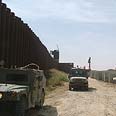
Gaza gunmen often smuggle arms from Egypt through the Philadelphi Corridor
צילום: חנן גרינברג
Egypt must combat arms smugglers
Egypt must follow peace accords and place troops on Philadelphi Route
Weird as it sounds, Israel has still not decided what to do with the Philedelphi Route, a buffer zone on the Egypt-Gaza border ceded to Israel by the 1993 Oslo peace accords, after its pullout from the Gaza Strip this summer.
Israel still has not determined whether it will really withdraw from Gaza by leaving the route, or continue to control it.
Most of the ministers in Prime Minister Ariel Sharon’s government are veering towards leaving it and therefore connecting Gaza to Egypt, which has prompted negotiations with Egypt in order to discuss transferring security responsibility of its border – or rather its responsibility of stopping weapon smugglers.
Egyptian President Hosni Mubarak was taken back by Israel’s proposal when it first made it a year ago, but later said he supported it. But while Israel talked about stationing about 750 Egyptian border police along the route, the Egyptians demanded to place 3,500 troops fortified with vehicles, observation and listening posts and missile launchers.
They also said this was only a first stage, and that they intended to station soldiers along Egypt’s border with Israel all the way to the resort town of Taba.
While examining Egypt’s terms, one cannot help but become suspicious that the Egyptians are not interested in the hot potato that is Gaza and that their agreement is directed solely at American ears, therefore their answer is proverbially negative.
Should Israel accept their offer, the Egyptians would benefit in the sense that the demilitarization of half of the Sinai peninsula would be reversed.
'Cruel dilemma'
And so Israel faces a cruel dilemma: If it agrees to Egypt’s outrageous terms, it may be rewarded by a little quiet on the Palestinian front, but would be hurt by the demilitarization of Sinai, one of its most strategic achievements since the Jewish state’s establishment in 1948.
If it rejects the terms and the army stays in the buffer zone, which is about 20-30 meters (65-98 feet) in length, it would not affect the pullout, Gaza’s economic and military burden would continue to rest on its shoulders and its plan to complete this complicated withdrawal would be questioned.
Also, the Egyptians would claim that Israel would retain security responsibility and that they could therefore not be held responsible for any weapons terrorists may smuggle into Gaza from Egypt.
As Egypt has chosen to make it difficult for Israel, it does not seem likely a fair agreement will be reached at the moment, which leads Israel to choose a third option: To use the same tactic it uses with the Palestinians – to act alone while creating a new status quo.
Israel must leave the Philadelphi Route and disengage from the Palestinians in Gaza, but it should not agree to any change in the current demilitarization that exists in Sinai.
Israel must make it clear to Egypt and the United States that after the army leaves Gaza, Egypt alone will be responsible for the weapon-smuggling, and should bear the burden by placing troops in the deployment dictated in the peace accords.
The agreement certainly allows appropriate intelligence, security and police surveillance on the smugglings, without endangering the status quo between the two nations.
Only then can Israel avoid the pitfall the Egyptians and Palestinians have pushed it into, while maintaining its interests.










